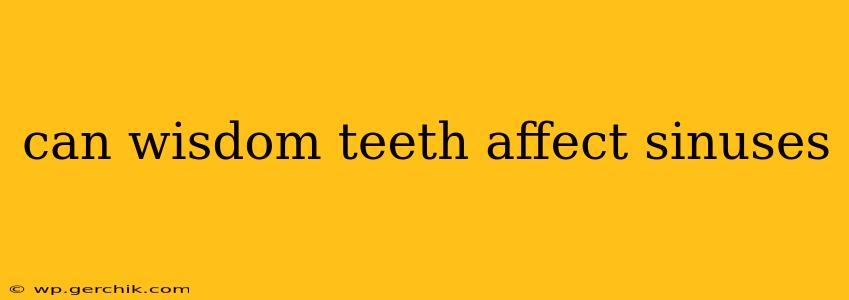Wisdom teeth, the third molars located at the back of your mouth, can sometimes cause problems far beyond just crowding or impaction. One surprising area of potential impact is your sinuses. While not a direct, always-present connection, the proximity of wisdom teeth to the maxillary sinuses (located above the upper molars) means complications can arise. This article explores the ways wisdom teeth can affect your sinuses and answers common questions surrounding this often-overlooked relationship.
How Close Are Wisdom Teeth to Sinuses?
The upper wisdom teeth are situated very close to the maxillary sinuses. In some individuals, the roots of these teeth may even extend into the sinus cavity. This close proximity means that any infection or inflammation around the wisdom teeth has the potential to spread to the sinuses.
Can Impacted Wisdom Teeth Cause Sinus Infections?
Yes, impacted wisdom teeth can indirectly lead to sinus infections. An impacted wisdom tooth (one that doesn't fully erupt) can create a breeding ground for bacteria. This bacteria can then potentially spread to the adjacent sinuses, causing sinusitis. The infection might begin as a periapical abscess (an infection at the root of the tooth) and then spread upwards. This is more likely if the tooth is severely impacted, causing difficulty in maintaining good oral hygiene in that area.
What are the Symptoms?
Symptoms of a sinus infection stemming from wisdom teeth problems can overlap with typical sinusitis symptoms, including:
- Facial pain or pressure: This might be concentrated around the upper molars and cheekbones.
- Headache: Often described as a dull, persistent ache.
- Nasal congestion: Difficulty breathing through the nose.
- Post-nasal drip: Mucus dripping down the back of the throat.
- Fever: A high temperature might indicate a more severe infection.
- Bad breath (halitosis): A persistent bad smell coming from the mouth, indicating potential infection.
Can Wisdom Tooth Extraction Cause Sinus Problems?
While wisdom tooth extraction is generally a safe procedure, there's a small risk of complications affecting the sinuses. This is particularly true during upper wisdom tooth extractions. During the procedure, a small opening might be created between the mouth and the sinus. This isn't always preventable, and in most cases, it heals without issue. However, it can sometimes lead to:
- Sinusitis: An infection of the sinus cavity.
- Dry socket: Although not directly related to the sinuses, a dry socket (a painful complication after tooth extraction) can indirectly contribute to sinus issues due to the proximity of the affected area.
What are the chances of this happening?
The risk of sinus complications after wisdom tooth extraction is relatively low, but it's important to be aware of the possibility. A skilled oral surgeon will take precautions to minimize this risk. Proper post-operative care is also crucial in preventing complications.
How to Prevent Sinus Problems Related to Wisdom Teeth?
- Maintain excellent oral hygiene: Brush and floss thoroughly to prevent infection around your wisdom teeth.
- Regular dental check-ups: Early detection of problems can prevent more serious issues.
- Follow post-operative instructions carefully: After wisdom tooth extraction, adhere closely to your dentist's or oral surgeon's instructions regarding cleaning, diet, and medication.
When Should I See a Doctor?
If you experience any persistent pain, swelling, fever, or other symptoms suggestive of a sinus infection after wisdom tooth extraction or if you notice signs of infection around your wisdom teeth, seek professional medical advice immediately. Early intervention is key in preventing complications.
Disclaimer: This information is for general knowledge and does not constitute medical advice. Always consult with a qualified dentist or oral surgeon for any concerns related to your wisdom teeth and sinuses. They can provide a personalized assessment and recommend the best course of action for your specific situation.
